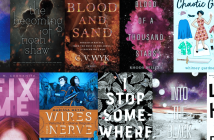In America, we gender everything: colors, toys, movies, books, clothing, hair styles, accessories, even jobs and pets (cat lady vs man’s best friend). Not only is it unneeded and incredibly frustrating, it also actively erases nonbinary and agender individuals. Media works to define humanity into “Male” or “Female” and accessorize accordingly. Women should wear this, watch that, eat there, exercise this way, have this profession, and utilize these emotions. Men should wear that but never this, eat this (but only that if it’s labeled for men), watch these things (but this is acceptable if you’re trying to get into a woman’s pants), have this job, and may utilize emotions from a pool about four.
Anything outside the specified guidelines is seen as wrong, not manly, or means you’re queer (in a completely derogatory fashion). Acting “like a girl” is an insult, which comes with its entire host of issues rooted in sexism and misogyny.
What I want to focus on is this idea that males cannot show emotion. Specifically, they cannot show emotion to each other beyond thumps on the back, firm handshakes, fistfights, or the occasional clinking of a glass pint.
Only one though. And keep your bar stools at least eight inches apart. No touching of elbows. You might catch The Gay.
I make jokes and you may or may not laugh but this is a box we’ve forced everyone who identifies as male into. It starts at birth (he’ll be such a ladies’ man!) and continues through school (boys don’t cry, grow a pair, man up, why don’t you go out for football?) and into adulthood where male bonding is expected around a grill, a man-cave, a bar, or a television no less than 60” across. Nowhere else. In fiction, we see the Bad Boy or the Nice Guy and that’s it.
One of my very good friends writes books with predominantly male characters and she constantly deals with negativity surround the emotional freedom of her characters.
Yes, freedom.
Because we as a society have restricted male emotions so much that a male character in a book expressing caring, sadness, regret, guilt, love, disappointment, desperation, or any of the other 847 (…ish) emotions humans are capable of is seen as “unrealistic” or “a baby man” or, even worse, “a mangina” (and I don’t need to tell you how gross and misogynistic and transphobic that is, right? Good).
Heaven forbid a male character actually cry on page. Or express care and concern for another guy and have it not be in a romantic fashion.
A boy crying is seen as weak.
Think about that for a minute. Why do we cry? When we’re in pain, when we’re hurt both physically and emotionally, when we’re overwhelmed with awe or nostalgia, when we’re happy, when we’ve lost something/someone dear, when we’re lost ourselves, when we’ve failed something important. Crying is a natural evolutionary response which broadcasts to those around us that we need help.
We tell boys crying makes them weak. It doesn’t matter the reason. They’re weak. Period. Most people would honestly rather see a boy punch a wall or slam a door than break down into tears.
Violence is preferable over natural emotion.
Think about that. In movies, in books, in television shows, in commercials…men have to behave a certain way or they’re seen as wrong or less than or unrealistic. Any emotion that would broadcast a need for help or a love for another person is seen as weak. Less of a man. Acting like a girl. An easy target.
You won’t get the girl if you cry.
You won’t get the promotion if you show emotion.
You won’t get the goal if you show anything other than rage or lust or some other sort of manly camaraderie.
And this isn’t just men doing this to other men (even though I’ve seen a lot of that in my time on this planet). I see many women doing this to men. Female reviewers pigeonholing male characters into this neat little “strong boy, bad boy, aloof boy, rugged man, manly man” box. We’re all complicit in this and, many times it’s casual.
Why does he have a Barbie?
Stop crying.
Isn’t it cute he’s following her around trying to hug her?
Buy him action figures and nothing but the color blue.
That crockpot toy has a gay voice so I’m not letting my son play with that.
Oh he’s just rough.
Boys will be boys.
Will they though? Will we let them?
Or is it more “boys will be my very narrow and media-dictated definition of what boys are.”
In 27 HOURS (Entangled Teen Fall 2017), this is something I thought a lot about as I wrote the various male characters alongside the female characters. How much pushback will I get if this boy cries? How much criticism will I get if adopted brothers are emotionally close? How quickly will this boy be labelled unrealistic because he feels so much and is open with those emotions? How many will point at the boy with the temper and rage issues and claim he’s accurate? How many of those opinions change when sexualities come into play? Bisexual, asexual, gay. What about disability? What about skin color? How many more stereotypes will be layered on top of how we already treat boys in fiction as each intersection presents itself?
It’s almost as if the further away we get from cisgender heterosexual male, the more acceptable emotions become. After all, they’re less of a man, right?
Why?
When you read or watch male characters in any sort of fictional setting and you have a knee-jerk reaction to something your brain is telling you is unrealistic, think for a moment why. How much of it is influenced bias telling you boys should only act a certain way?
And what will you do to change that? In your own habits and those around you?





1 Comment
Pingback: Weekly Recap | Lindsay Smith